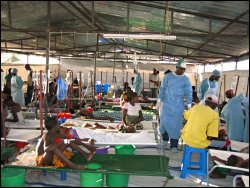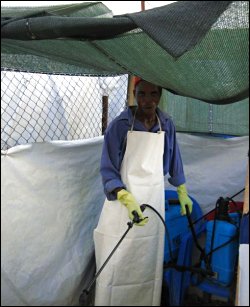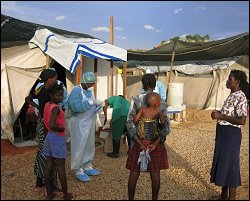MSF Urges Government to Take Stronger Action

|
Luanda, Angola, April 7, 2006 — With the number of cholera cases increasing rapidly in and around Angola's capital Luanda, the international medical organization Doctors Without Borders/Médecins Sans Frontières (MSF) calls on Angolan authorities to quickly provide more resources to contain the growing outbreak.
In Luanda, MSF has opened a cholera treatment center (CTC) inside the shantytown of Boa Vista and two others in the Cazenga and Kilamba Kaxi areas. Since the outbreak was declared on February 13, more than 2,500 people have been treated in the MSF centers.
"All of our centers are running at maximum capacity," says Richard Veerman, MSF's head of mission in Angola. MSF is now preparing to open an additional CTC in the city's Sambizanga slum, which will increase capacity by 200 beds.

|
Over the past 48 hours, almost 500 new patients have arrived in MSF's centers.
"Yesterday in Boa Vista, all 180 beds were occupied. This morning we managed to add 20 more. Yet, right now we are forced to have patients share their beds," says Veerman.
Containing the outbreak has become more difficult as cholera has now spread to areas outside of Luanda. In Cuanza Norte province, approximately 500 cases have been reported, including 49 deaths; in Benguela province, 676 cases have been reported, along with 63 deaths; and in Bengo province, 790 cases have been reported, with 33 deaths. Since the outbreak began, official figures report than 4,500 people have been infected with the disease and 205 have died.
To stop the spread of the disease and to treat patients, more resources need to be mobilized quickly. At present, there is a lack of Angolan health workers, ambulances to transport infected patients to treatment sites, and an adequate trucking system to provide safe drinking water to the population. The MSF team is also facing customs delays that hold back the deployment of critically needed medical and logistical supplies.
"On top of all these difficulties we find that many people do not reach our centers early enough, either because they do not find transportation or because they are simply scared of moving around the city after nightfall, when the streets are unsafe," says Veerman.

|
MSF now has 17 international staff (including three medical doctors, five nurses, seven logisticians, one information-education-communication specialist, and one administrator) and more than 80 Angolan staff (among them 28 medical doctors and 16 nurses) working in the cholera units. The teams are providing patient care and are working to contain further spread of the disease. MSF has also started activities in affected areas of the capital to inform the local residents about the disease and how to prevent it.
Background:
Cholera in Angola
From 1987 until 1995, Angola, particularly Luanda and the coastal areas, was affected by recurrent seasonal epidemics of cholera, which resulted in an estimated 90,000 cases and more than 4,500 deaths. Since 1995, there have been no major cholera epidemics in Angola and only occasional reports of unconfirmed cases within Luanda. In 1999, MSF assisted in the creation of an extensive cholera preparedness plan for the city of Luanda.
What is cholera?
Cholera is caused by bacteria and transmitted through contaminated water and food. If left untreated, it can cause a mortality rate of 25% to 50%. Those infected usually die from dehydration. Infected persons (whether symptomatic or not) can carry and transmit the vibrio cholerae, the bacterium that causes cholera in humans, up to four weeks after they have been infected themselves. A small number of individuals can remain healthy carriers for several months. A number of factors conspire to cause a cholera outbreak: poor hygiene conditions, overcrowding and a lack of safe drinking water.



